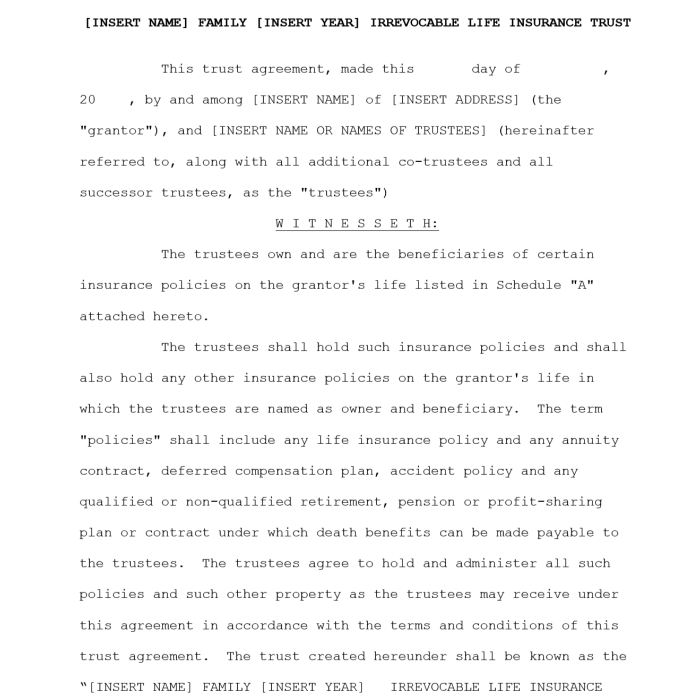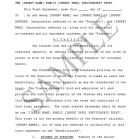Irrevocable Life Insurance Trust With Crummey Powers And Sample Crummey Letter (40 Pages)
Two Important And Useful Additions
This is an irrevocable trust created by a grantor and funded (primarily or exclusively) by life insurance policies. The trust will be the owner and beneficiary of the life insurance policies. The intent of this trust is to remove life insurance policies from the grantor’s taxable estate if the grantor lives three years after transferring the policies to the trust – unless the trust owns the policies from their inception, in which case there is no issue with the three year look-back rule. This trust is for the primary benefit of the grantor’s spouse for life, with the remainder payable to the grantor’s children.
Also included is "A Sample Notice Of Crummey Withdrawal Rights" for the trustee to send to the Crummey beneficiaries whenever a contribution is made to the trust.
Two Important And Useful Additions
1. the "Uniform Gifts To Minors Act" in Article 8 and
2. specific powers about "decanting" as paragraph V. of Article 10
This is an irrevocable trust created by a grantor and funded (primarily or exclusively) by life insurance policies. The trust will be the owner and beneficiary of the life insurance policies. The intent of this trust is to remove life insurance policies from the grantor’s taxable estate if the grantor lives three years after transferring the policies to the trust – unless the trust owns the policies from their inception, in which case there is no issue with the three year look-back rule.
This trust is for the primary benefit of the grantor’s spouse for life, with the remainder payable to the grantor’s children.
The trust contains Crummey powers (Article 7 A) to enable the grantor’s payment of the life insurance premiums to qualify for the present interest gift tax exclusion. It also provides for a “safety net” QTIP Trust (Article 7 B) for the benefit of the surviving spouse just in case the insurance policies are found to be included in the grantor’s estate – they will then be paid to a trust for the surviving spouse that qualifies for the estate tax marital deduction.
Article 7 C contains the major dispositive provisions, i.e. a lifetime trust for the surviving spouse paying the spouse all of the trust income, principal in the discretion of the trustee, and giving the spouse a five and five power of withdrawal. At the second death of the spouses, the trust is divided into separate shares for the grantor’s children to be received outright at age 35. If a child has not yet attained age 35, the child’s share is held in trust until that time, with payments of income and principal within the discretion of the trustee.
Note also the provisions of Article 7 C 4, which address S corporation ownership and provide a qualifying trust arrangement, should such an arrangement become necessary.Also included is "A Sample Notice Of Crummey Withdrawal Rights" for the trustee to send to the Crummey beneficiaries whenever a contribution is made to the trust.
Author:
Steven G. Siegel is president of The Siegel Group, a Morristown, New Jersey - based national consulting firm specializing in tax consulting, estate planning and advising family business owners and entrepreneurs. Mr. Siegel holds a BS from Georgetown University, a JD from Harvard Law School and an LLM in Taxation from New York University.
He is the author of several books, including: Planning for An Aging Population; Business Entities: Start to Finish; Taxation of Divorce and Separation; Income Taxation of Estates and Trusts, Preparing the Audit-Proof Federal Estate Tax Return, Putting It Together: Planning Estates for $5 million and Less, Family Business Succession Planning, Business Acquisitions: Representing Buyers and Sellers in the Sale of a Business; Dynasty Trusts; Planning with Intentionally-Defective Grantor Trusts; The Federal Gift Tax: A Comprehensive Analysis; Charitable Remainder Trusts, Grantor Trust Planning: QPRTs, GRATs and SCINs, The Estate Planning Course, The Retirement Planning Course, Retirement Distributions: Estate and Tax Planning Strategies; The Estate Administration Course, Tax Strategies for Closely-Held Businesses, and Tort Litigation Settlements: Tax and Financial Issues.
Mr. Siegel has lectured extensively throughout the United States on tax, business and estate planning topics on behalf of numerous organizations, including National Law Foundation, AICPA, CCH, National Tax Institute, National Society of Accountants, and many others. He has served as an adjunct professor of law at Seton Hall and Rutgers University law schools.The Siegel Group provides consulting services to accountants, attorneys, financial planners and life insurance professionals to assist them with the tax, estate and business planning and compliance issues confronting their clients. Based in Morristown, New Jersey, the Group has provided services throughout the United States. The Siegel Group does not sell any products. It is an entirely fee-based organization. Contact the Siegel Group through its president, Steven G. Siegel, e-mail: [email protected].
-
 3 Irrevocable Life Insurance Trusts (75 Pages)Special Price $199.00 Regular Price $237.00
3 Irrevocable Life Insurance Trusts (75 Pages)Special Price $199.00 Regular Price $237.00


